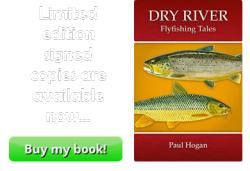On the face of it this sounds like a dumb question. But I am trying to be serious. Maybe “friends” is too strong a word. It seems appropriate only when describing people. It seems nonsensical to consider other animals, like say, cows in a herd, as being friends. But if you have dogs, as we do, the notion doesn´t seems quite as outlandish.
Two of our dogs, Bonita and Chica, are sisters. The other two, Barney and Boris, are just puppies. We all spend much of our time falling and tripping over the damn things. It is clear however that they are “friends” in the sense that they interact enthusiastically and spend time in one another´s company, much as Bonita and Chica have done for many years.
What about fish?
I have experienced very “odd” behaviour on many occasions on the river. It is not infrequent to play a barbel or a carp which, as it runs around the river is very closely “shadowed” by another fish, or sometimes more than one. To my knowledge, similar claims have been made for salmon although I have never caught one myself. The “companion” fish may even swim quite close to the angler during the heat of battle throwing its normal caution to the wind. Why?
Any serious suggestion that fish can be “friends” would be greeted in the scientific community as hopelessly anthropomorphic. A scientist might suggest I get a bit of therapy at the funny farm. But if the word “friends” is very loosely defined in the limited sense that it describes an individual with which another individual might spend time in preference for others of the same kind, maybe it is not so crazy after all.
To my knowledge, the shoaling activity of fish is well understood and the advantages to individual fish in terms of protection from predators are clear. Each fish benefits from the extra “eyes and ears” of those around them, and a confusing melee might make individuals more difficult to pick out by predators.
As I write this my two teenage kids are sitting on the sofa opposite. Leo has earphones stuck in his ears and is watching something on Youtube. Pippa is glued to a TV rerun of “Friends”. It sometimes seems like they live in a different world from us. Generations of humans certainly differ now more than perhaps they ever have in the past. Later I will run the kids over to friends´ houses where they will hang out with others of their own age.
This behaviour, familiar to all the parents of teenagers, does not seem confined to humans. Fish very often shoal with others belonging to a particular year class. If you catch a particularly big perch or bream it is a fair bet that there are a few more nearby.
But the benefit of hanging out with your mates may depend on how you plan to make a living for yourself. If you are actively competing with your siblings for a particular lie in a stream, as trout do, or a source of fodder fish, as pike do, then it might make sense to be intolerant of others of your kind. Maybe it makes more sense to chase them away or even to eat them. Of course, when they have reproduction on their minds, both pike and trout will ignore the usual rules and override their natural intolerance of one another.
Fish, in my view, have a kind of PR problem. Everybody thinks that they are thick! They are not credited as being smart like the “higher” vertebrates. Birds and mammals are considered to be quite adaptable and “clever”. We used to keep hens until a semi-feral campo dog broke in and killed them all. Hens are fine birds but, however much you love them, there is no getting away from the fact that they are pretty thick. Sheep are too.
But even hens have a social awareness which is well established and a means for determining individual rank within the “pecking order”. So clearly each individual is “known” within the group. Fishermen, more than scientists, know just how canny a fish like a carp can be. After all we spend so much time being outsmarted by them! In my book a wily carp is as “smart” as a hen and I would be inclined to credit them with knowing the others in their group as individuals – maybe even to the point of getting on better with some than with others. Some might have “personalities” which make them more likely to be leaders, and others to be followers. Maybe there is also some kind of rank within a shoal?
Although few would disagree that it makes sense for fish to form associations if the benefits outweigh the disadvantages, maybe I am alone in thinking that, under certain circumstances, fish develop allegiances and “friendships” which are more complex than anyone might suspect.
And if I need to spend a spell in the loony bin weaving baskets out of spaghetti, then so be it.



